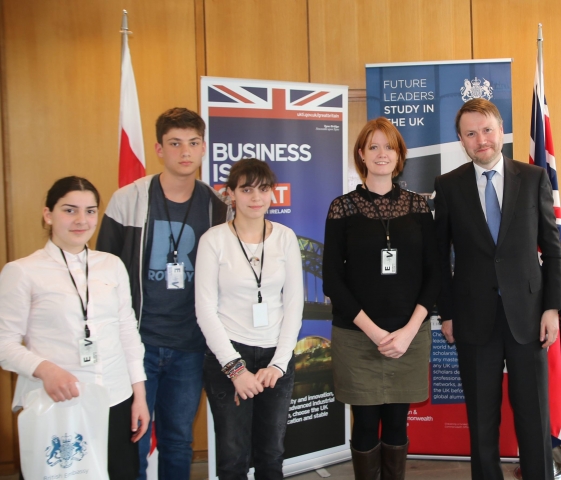GT Future Journalists Interview British Ambassador Justin McKenzie Smith
DEADLINE EXTENDED- TWO DAYS LEFT!!!
The Future Journalist competition gives Georgian youth throughout the country the chance to showcase their journalistic skills in three stages, with the ultimate prize a two-week English and Journalism course in the UK this summer. Organized by Georgia Today Education and supported by UK Bridge, the competition aims to discover the best future journalists in Georgia.
GRAB YOUR CHANCE!!! ENTER THE COMPETITION!!!
Aged 13-16? Want your chance to grab a two-week language and journalism course in the UK? Send 10 questions in English that you would ask First Lady Maka Chichua by midnight on MAY 7TH. If you’re chosen by the GT jury, you will interview the First lady in person with three other potential winners. If your written interview wins, you will go through to the last stage of the competition to interview Prime Minister Kvirikashvili. The winner of that last writing competition goes to the UK this summer! Send YOUR questions to info@georgiatoday.ge
The first of three interviews saw the jury-selected three under-17s, two from Gori and one from Tbilisi, meeting the British Ambassador, who kindly agreed to let them ask him his thoughts and ideas on a variety of topics. After the interview, the students wrote up their interviews in their own styles and a jury made up of English language experts and professional journalists and marketers chose one winner who will go through to the final round to interview the Prime Minister of Georgia. See the winning interview and excerpt of the runner-up interviews below.
Interview by Mariam Makhviladze, winner
Mr. Justin Mckenzie Smith has been the Ambassador Extraordinary and Plenipotentiary of the UK to Georgia since 2016. Before he held the post of UK Ambassador in Georgia, he worked in a number of different countries as a diplomat. Within the competition “Future Journalist,” on April 3, GEORGIA TODAY met him for an interview about the cultural, educational and diplomatic relations between the UK and Georgia, and to find out his feelings about the Georgian people, traditions and sights.
What was your first impression of Georgia?
I was lucky to come to Georgia for the first time in 1999. I found it a fascinating, welcoming and beautiful country. I got a good impression of the Georgian people, who were so welcoming to me on my first visit.
Before you arrived in Georgia, in which countries did you work and what was your job in these countries?
I’ve been a diplomat for 24 years. In that time, I’ve worked in the UK and Russia as a British Ambassador, in New York at the United Nations, and in Mexico City at the British Embassy there.
A large number of students receive an education in the UK. How do they manage to study there?
There are several ways. For 25 years, this Embassy has been supporting the Chevening Scholarship, and every year we send between 15-20 brilliant Georgian students to the UK to do Master’s Degrees. The Georgian government also provides scholarships to students and some people are able to study there off their own backs. For me, education is a really important part of our relationship and I support it very, very strongly. The British education system is one of the best in the world.
With which ministries of Georgia does the British Embassy have relations?
Our partnership with Georgia is a political partnership but it also includes lots of other issues, for example: trade, business, education, economics and finance are all very important. We meet with the Ministry of Foreign Affairs regularly, and we have a very close relationship with the Ministry of Defense, with numerous activities ongoing between the Georgian and British Armed Forces. So, in every case, I see a really active and positive relationship.
How do you try to promote the British culture in Georgia?
We do that together with our partner organization, the British Council, which runs six English clubs in the regions of Georgia. We work together to promote British culture through the English language, through student scholarships, and also by supporting connections between Georgian society and British society. We have twinning relationships between some of our cities, between Tbilisi and Bristol, Kutaisi and Newport. I think that is fantastic because they are about education, sport and culture and I hope we will do more in the future.
Excerpt of an interview by Elene Piralishvili, runner-up
Tell us your favorite place in Georgia and your favorite Georgian tradition
I like the whole of Georgia. Tbilisi is amazing, I really like Kakheti, and the north of Georgia is also very beautiful, so it’s a tall order to say which is best. There are also a lot of Georgian traditions I like, for example the supra (feasting) tradition. I like traditional songs too, but I think the most important Georgian tradition is tolerance.
Have you developed relationships with anyone from the non-political sector in Georgia?
I know many Georgian people from business and government, but I don’t know many non-political people from Georgia. I wish I did, as I enjoy talking with people who aren’t in politics, especially the young because they are the future of the country.
Excerpt from an interview by Giorgi Giorgadze, runner-up
Georgian Parliament changed the Constitution, making Georgia a Parliamentary Republic and meaning the president will be elected by lawmakers. What is your opinion? Will it raise the degree of democracy in Georgia?
Well, there’s democracy in Georgia already. The constitutional changes are for the Georgian people to decide. It is a Georgian choice; people elect Parliament.
What are your future plans once your term in Georgia ends?
I don’t know yet. But I want to see more of Georgia before I go!












